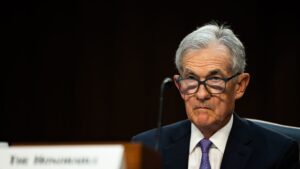Why the Federal Reserve Might Hold Off on a September Interest Rate Cut
As the markets now anticipate a September interest rate cut in the U.S., economist Carl Weinberg believes that the Federal Reserve has a compelling reason to wait. While money market pricing indicates a high probability of a rate cut at the Fed’s fall meeting, recent comments from Fed Chair Jerome Powell have added complexity to the decision.
In a recent interview on CNBC’s “Squawk Box Europe,” Weinberg, chief economist at High Frequency Economics, highlighted the risks associated with easing monetary policy, despite the growing expectations for a rate cut. Powell’s remarks about inflation metrics, unemployment levels, and economic growth suggest that the current economic conditions may not warrant immediate action.
Unemployment is hovering around 4%, inflation is edging closer to the target of 2%, and the economy is expanding at a steady pace. In light of these positive indicators, Weinberg questions the necessity of a rate cut at this juncture. While the data may seem to support a cut in September, uncertainties loom over the decision.
It’s essential to consider that the economic landscape can evolve significantly between now and the Fed meeting in September. With two more CPI prints scheduled before the meeting, the Fed’s outlook may change based on the incoming data.
Unlike some other major economies that have already enacted rate cuts this year, the U.S. has been more conservative in its approach. While inflation has remained relatively subdued compared to other countries, the Fed has been cautious in its response, potentially falling behind its counterparts.
The decision on whether to implement a rate cut in September is not set in stone, and a wait-and-see approach might be the prudent choice for the Federal Reserve. Stay tuned for updates as the economic situation continues to evolve.
Interactive Data Visualization: Global Interest Rate Cuts
Explore the interactive chart below to see how central banks around the world have adjusted their interest rates in response to economic conditions:

